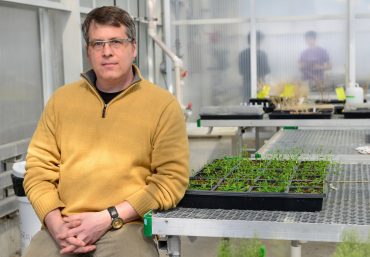Researching Plant-Bacterial Interactions
Scott C. Peck Lab
Research Interests
Bacterial pathogens spend the majority of their lives in the soil competing with other microbes for nutrients. However, when they chemically recognize the presence of a potential plant host, the bacteria activate a virulence program to suppress plant immunity. Conversely, plants only activate defense responses when they recognize the presence of the potential pathogens.
By studying these interrelated chemical recognition processes, the Peck lab has discovered the chemical signals utilized by bacteria to activate their virulence programs, and we have isolated mutants that fail to secrete these signals, rendering the plants more resistant to infection. We are currently defining the signaling pathways that regulate the secretion of these signals with the goal of producing plants with broad-spectrum resistance to pathogens.
LAB MEMBERS


Research Topics
-
Crop improvement and agricultural sustainability
-
Multi-omics and bioinformatics tools
-
Multi-stress plant responses
-
Phosphoproteomics and protein kinase studies
-
Plant immunity and stress responses
-
Plant-microbe interactions
-
Crop improvement and agricultural sustainability
-
Multi-omics and bioinformatics tools
-
Multi-stress plant responses
-
Phosphoproteomics and protein kinase studies
-
Plant immunity and stress responses
-
Plant-microbe interactions
In the news

Dec. 16, 2022
Competing signals: scientists explore how iron sensing and plant immune signaling interact with $1.2 million NSF grant
Bond LSC researchers Scott Peck (right) and David Mendoza (left) collaborate with MU biochemist Antje Heese in a new $1.2 million NSF grant. By Josie Heimsoth, Bond LSC Plants must integrate many environmental signals to successfully grow and reproduce. Three researchers at MU have recently discovered a new connection between some of these signals that recently led to a $1.2 million National Science Foundation (NSF) grant that may lead to improvements in both plant immunity and plant nutrition. Lead researcher Scott Peck has studied how plants respond to changes in their environment…

March 1, 2018
Piecing together plant immunity
Scott Peck studies Arabidopsis and how bacteria perceive it before initiating an infection. Roger Meissen/ Bond LSC By Madelyne Maag | Bond Life Sciences Center Bacteria and disease show no mercy to any organism they can effectively attack, including plants. Yet, plants can also develop an immune response against these threats from their complex genetic makeup. Scott Peck’s research delves into how plants do this and how bacteria evade those defenses. Over the course of the last decade, the Bond Life Sciences Center investigator and professor of biochemistry has specifically looked into how plants are able to…

March 8, 2017
Scott Peck #IAmScience
Scott Peck, a biochemistry professor at Bond LSC. | photo by Morgan McOlash, Bond LSC By Mary Jane Rogers | Bond LSC “#IAmScience because I want to discover. I want to ‘see’ – by understanding – things that others haven’t ‘seen’ before.” Every day we make decisions based off on what we encounter in the environment. Plants do the same thing. Scott Peck, a Chicago-area native, is a biochemist who studies how plants translate information they receive about the environment (such as changes in light and temperature) into their own chemical “decisions”, also known as signal transduction.
